Our Vision and Mission
Vision of Royal Crown
School
Vision: To
provide students with distinctive learning content based on creativity and
competition to achieve the vision of Qatar 2030
تزويد الطلاب بمحتوى تعليمي مميز يعتمد على الإبداع والمنافسة لتحقيق رؤية قطر 2030
Mission of Royal Crown School
Mission: To offer a safe,
stimulating, and supportive learning environment that encourages students to recognize, learn, think research and communicate effectively
مهمتنا المدرسية هي توفير بيئة تعليمية آمنة ومحفزة وداعمة تشجع الطلاب على التعرف والتعلم والتفكير والبحث والتواصل بفاعلية
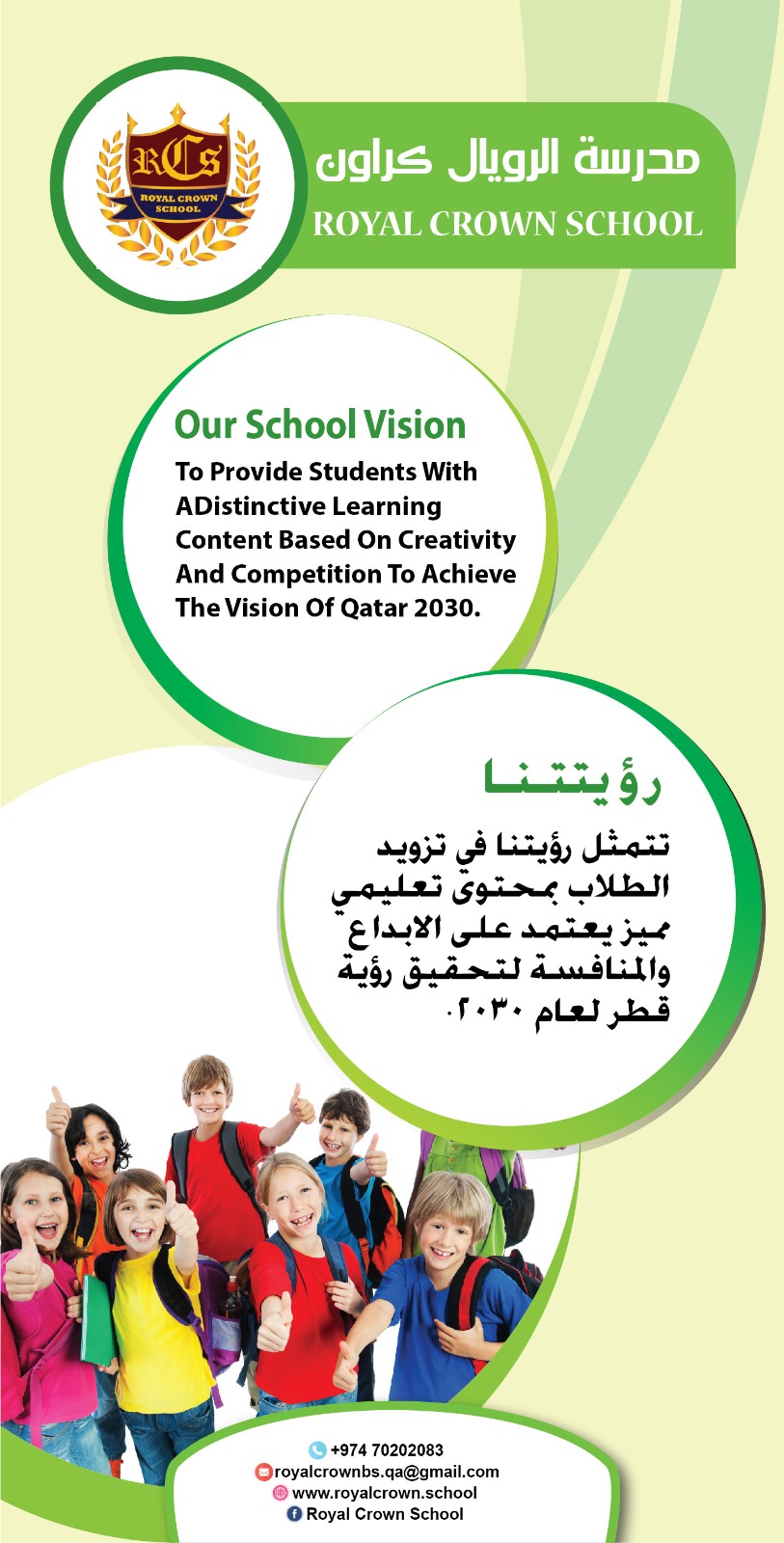
Our Values
Respect – It involves taking responsibility for each other. As well as, speaking to and interacting with others in a courteous manner along with being reliable and trustworthy.
Care – Students will care for one another and the environment .hence, Develop sense of belonging to the community.
Cooperation – Students will work together in a team .In addition to contributing and sharing in a helpful way.
Integrity –Involves Acting in accordance with principles of moral and ethical behavior, besides ensuring consistency between words and actions.
Responsibility –Students will be accountable for their actions. They will be able to resolve differences in a constructive way that is convenient to civic life.
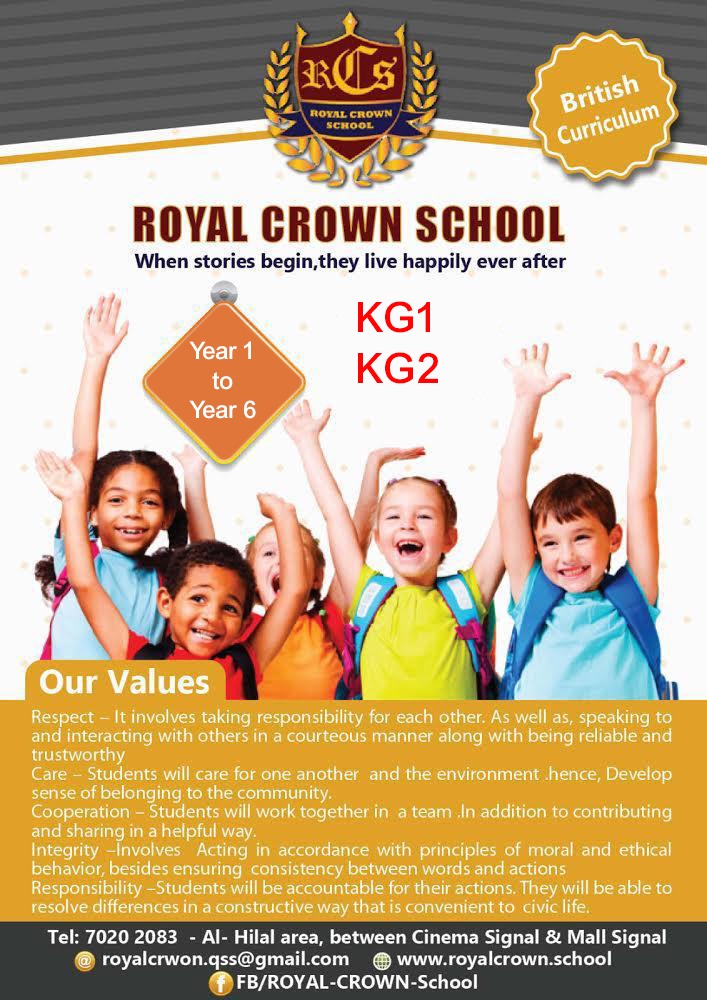
School Overview
We provide at Royal Crown School of Qatar a safe and happy learning environment where each child is valued and inspired to achieve all that they can. We are a learning community, passionate about providing British Education, which inspires and encourages learning and intercultural understanding. Our school facilitate self-discovery and the development of unique interests, gifts and talents. Through our personalized approach to learning we aim to develop independence and responsibility in pupils , as well as nurture social and emotional security. Royal Crown School Uses technology to stimulate and extend boundaries of learning .
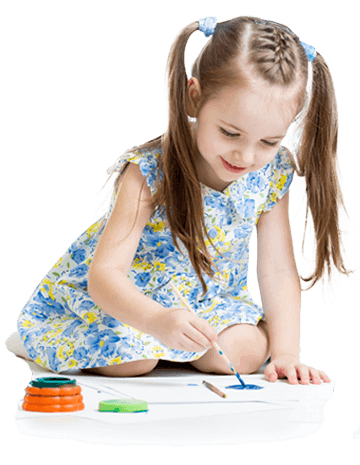
The School Behavior and Assessment Policy
7.14 The School Behavior Policy
At Royal Crown,
we believe that all pupils should be aware of the standards of behaviour that
are expected of them and take ownership and responsibility for consistently
reaching these standards. To achieve this, we aim to ensure that every member
of the school community feels valued and respected, and that each person is
treated fairly and consistently. We are a caring, inclusive community, whose
values are built on mutual trust and respect for all. The school’s behaviour for
learning policy is therefore designed to support the way in which all members
of the school can learn and work together in a supportive, considerate,
respectful and responsible way. It aims to promote an environment where
everyone feels happy, safe and secure in both the school and wider community.
We believe:
-All children have the right to learn and play in a safe,
friendly and happy school.
-All staff has the right to work in a safe, friendly and
happy school.
-Parents have a right to feel welcome and be secure in
the knowledge that their children learn and play in a safe, friendly and
supportive environment.
The school has a Code of Conduct (Our Royal Crown Code), but the primary
aim of the behaviour for learning policy is not a system to enforce rules. It
is a means of promoting good relationships and positive behaviour, so
that people can work together with the common purpose of helping everyone to
learn.
Purpose:
-Assure
a disciplined, positive and safe learning environment for all students and
members of school community
-Identify
student behaviour expectations and unapproved behaviour
-Clarify
policies and procedures regarding any behavioural infractions
-Promote
moral and ethical values in the school community
Expectations:
Students are expected to:
-Display high morals and ethics,
commitment to religious and cultural values
-Show respect, compassion and
cooperation with staff and peers
-Maintain a clean outfit and high
personal hygiene
- Participate
actively in lessons, morning assembly and school activities
- Practice
a healthy life style in their daily diets
Students Expectation:
-Adhere to
the school dress code
-follow
classroom rules
-Should
not wear make –up or keep nails long
-Punctual
in doing homework and bring required books and stationery
-Should
not use bad language or words with staff or peers
-Should
not leave classrooms without teacher permission or a hallway pass
- Should
not eat inside the classroom or chewing gum.
- Should
not bring and misuse the electronic devices in class, and this includes:
phones, IPad, IPod…and using headphones.
-Should
not sleep in class during the lessons.
Parents Expectation:
-Drop the students on time.
-Encourage students to follow the school rules and behaviour
expectations.
-Follow up on behaviour concerns and to implement the
suggested consequences.
-Expected to act as good role models for their children.
-Asked to inform the school if there are any circumstances
that may affect their children behaviour.
-Expected to support any disciplinary action taken by the
school and to ensure their children understand that school and home are working
together and are in agreement.
At Royal Crown Primary School and Kindergarten, we believe that all
students should be aware of the standards of conduct expected of them and take
responsibility for consistently reaching these standards.
To achieve this, we aim to ensure that every member of the school community
feels valued and respected, that everyone is treated fairly. In addition, our
values depend on mutual trust and respect for all. We aim to foster an environment in which
everyone feels happy and secure in both the school and the wider community.
The role of children:
The school expects all students to show respect for each other, to all school
and kindergarten staff, teachers, management, workers, and anyone else who may
meet during the school day. It is well-known that the first objective of
teaching in the kindergarten is modelling and setting the best example of
behavior to get the best of students.
Behavioural incidents or intentional
harm to other students or employees will not be tolerated. They are expected to abide by the school
rules, listen, follow the instructions of staff and behave well. Students
follow rules of the administration especially when they are informed of the
rules of behavioural discipline, including any measures put in place to support
their behaviour, such as behaviour support programs.
With the support and guidance of all staff, we expect students to follow
behavioural control policies, such as listening when someone is talking, using
kind words.......... etc. The policies
should be signed and displayed with pictures in a prominent place for employees
and students. Children are always
expected to adhere to these rules and are referred to when needed by
staff.
The role of the principal:
It is the responsibility of the principal to continuously implement the
school behaviour policy throughout the school and show the effectiveness of
these policies. The principal's
responsibility is to ensure the health and safety of all children in the School. The principal supports employees throughout
the implementation of the policy, by setting standards of conduct, and
supporting employees in implementing this policy through the curriculum and all
methods that support spiritual, ethical, social and cultural aspects.
The social worker keeps records of reported incidents of misconduct, and
report the school principal up-to-date.
Teachers’ responsibilities:
All staff members of the school staff should be aware that the first step
to enhance good behaviour is to be a role model, which means that all employees
and anyone else who comes to school must show responsibility and
professionalism. The school ensures consistency of discipline by everyone so
that the limits of behaviour and penalties are clear to all and are applied
fairly without discrimination, considering individual differentiation between
students and different cultures.
We work with parents to understand their children and their behavior. We do
believe that, in conjunction with clear rules, appropriate rewards and good
support systems, we can build an effective learning community. Al Royal Crown
will regularly inform parents about good or bad behaviour. We encourage parents to contact teachers on
K12net if they are concerned about their children's behavior. All needed is done
to support parents whenever they need. We promote good behaviour in the
curriculum. In addition, school rules and best behaviour together are displayed
on the walls in the classroom and are located around the kindergarten.
RCS will take all reasonable
measures to ensure the safety of all students and staff, including protection
against bullying. We aim to raise awareness
regarding bullying and other harmful behaviours using preventive strategies,
among other things, by developing activities to enhance the social, emotional
and behavioral skills of students.
It is the responsibility of the homeroom teacher to ensure that students
adhere to the code of conduct, and that students behave responsibly during
lesson time and when moving around the campus.
The teachers in the classroom in our school have high expectations of
children in terms of behaviour and strive to ensure that all children work as
hard as they can.
If the child is abused repeatedly, the school maintains a record of all
these incidents. The class teacher must deal normally with the students who are
troubled. If the misconduct continues, the teacher of the class seeks help and
advice from the social worker, and then from the school principal, who, in
turn, usually calls for a meeting with the parents in collaboration with social
worker.
RCS uses some behavioural support institutions to give lectures to students
to support and guide them. The classroom teacher may offer a range of
preventive treatments in response to inappropriate behaviour, for example,
certain activities as a reward.
The teacher reports to parents about the progress of each child in their class.
The role of parents:
Parents have an important role to play in ensuring that their children are
responsible for their behaviour. We ask parents to respect and support the
policy of conduct in the school and the authority of staff. Royal Crown maintains
a safe and orderly routine with policies that parents must respect, including
(the obligation of the parent to respect the attendance times for morning and
departure on time. Also, parents encourage child to comply with rules of
wearing a school uniform ironed and clean and encourage the child to abide by
all school rules and procedures).
The school requires parents to cooperate with administration to support
their children's learning, including informing the school of any special
educational needs or personal factors that may lead to unexpected behavior for
their child. We also ask parents to attend regular meetings with staff or school
administrative to discuss their children's behaviour and to abide by any
behavioural support agreements or plans developed by the social worker.
The Role of School Management:
Royal Crown School administration is responsible for developing general guidelines on discipline standards, following up on their implementation and measuring their effectiveness and the school principal should follow up the implementation of behaviour policies objectively and on regular basis.
----------------------------------------------------------------------------
7.10 Assessment Policy
Royal crown school believes on All
students are consistently held to high expectations.
Grades are based on multiple and varied tasks/assessments over time, grading
practices yield grades that are understandable, meaningful and reflective of
student learning.
Grading scales are precise, clear and fair and are communicated to students and
parents.
At the beginning of each term, every
teacher shall explain to students orally the grading criteria that will be used
for evaluating their academic performance. A copy of each grading policy and
subject specific will be kept in the principal’s office.
-Formative
term assessment conducts through the term.
-By
the end of term each student will receive a report card that highlights their
academic performance in all areas.
-Percentages
and grade boundaries will show up on the report cards to ensure that parents
are fully aware of their children’s achievement.
School formal assessments during term for year (1-6)
-School
enter exam
-School
diagnostic test
-School
first Quiz
-School
Midterm exam
-School
Second Quiz
-School
final exam
Explanation of final marks:
Achievement or progress shall be reported for
year 1 to year 6 as:
90 - 100 excellent
progress
80 - 89 very good
progress
70 – 79 good
60-69 satisfactory
50 - 59 need
support
0-49 poor
Grades are to be recorded on
cumulative folder (permanent record). The student may be retained upon parent
request.
Marking System:
Quiz 1: 10Marks
Mid Term: 30 Marks
Quiz 2:10 Marks
Final Exam: 40 Marks
Homework and behaviour: 10 Marks
Diagnostic test
A diagnostic test is a test that helps
the teacher identify problems that students have with English, Math and Arabic.
School uses the marks to track
students’ academic reviews and for remedial classes plans for each one.
At the beginning of the school year, we conduct a
diagnostic test in the form of children's activity to determine their needs in
order to know their different learning styles and abilities. The analysis of
the result of the diagnostic test enables teachers to design classroom and
extracurricular educational activities that suit those abilities and
differentiation. Remedial plans will be developed for the children who need
educational support in consultation with the parents of that group of children,
as well as for the category of high achievers and talented children to design
classroom and educational activities that develop their talents and enrich
their mental abilities.
For Kindergarten:
The kindergarten is an independent educational stage that has its entity
and is not less important than other educational stages. It has comprehensive
educational objectives which meet the needs of children and develop them
mentally, socially, linguistically, physically and ethically in engaging
educational ways. Since Royal Crown Kindergarten is providing education for
Early Years Foundation Stage, assessment is very important for the children of
this stage because it aims to assess the performance of the kindergarten and
ensure the quality of its educational outcomes. Assessment is also to provide
accurate and documented data on the quality of education in it to take better
procedures. It is effective for improving and developing, enhancing staff
capabilities at the Kindergarten in working to develop and improve their
performance, and providing decision makers, parents and the community with
reports on the quality of education their children receive, in order to achieve
the principle of accountability.
The assessment policy in Royal
Crown kindergarten is appropriate to the age, mental, linguistic and physical
level of children at this stage, to be tested through activities, speaking, and
colouring, writing letters, words and numbers. The evaluation will be in three
forms:
-Ongoing assessment
-End of Term report
Teachers use various assessment strategies such as question-and-see,
interviews and samples of children's work. They also use a weekly tracking
sheet and daily snap observation then they provide feedback weekly using K12net
(less pair and group work in any pandemic to keep social distance)
The assessment is used to ensure that the curriculum and education conform
to the British curriculum standards provided, and that all assessments are
linked to clear learning and individual objectives.
Remedial Plans
The primary objective of the remedial plans in Royal Crown School is to
prepare the students to reach at par with average students with special care
focused on the student’s weakness area.
This is achieved by building the basic skill of the students which revolves
around the English and Arabic weakness.
Remedial programs are designed to bridge the gap between what a student
knows and what he’s expected to know.
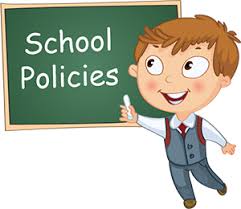


Our Features
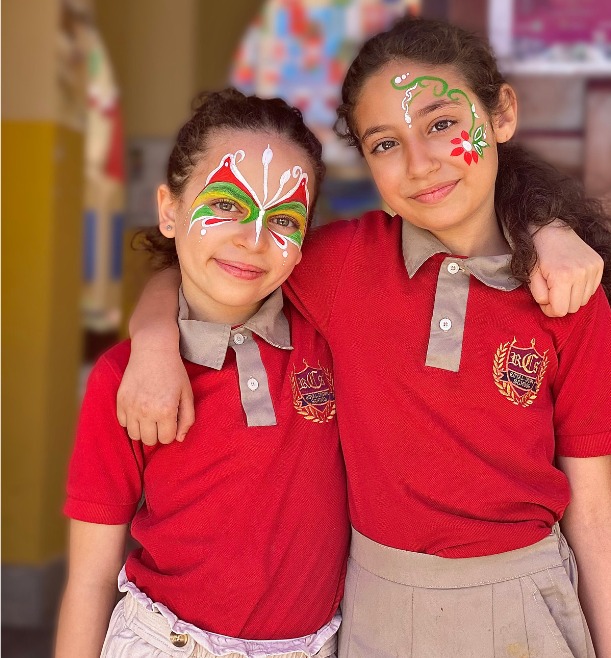
 Royal Crown School
Royal Crown School




















